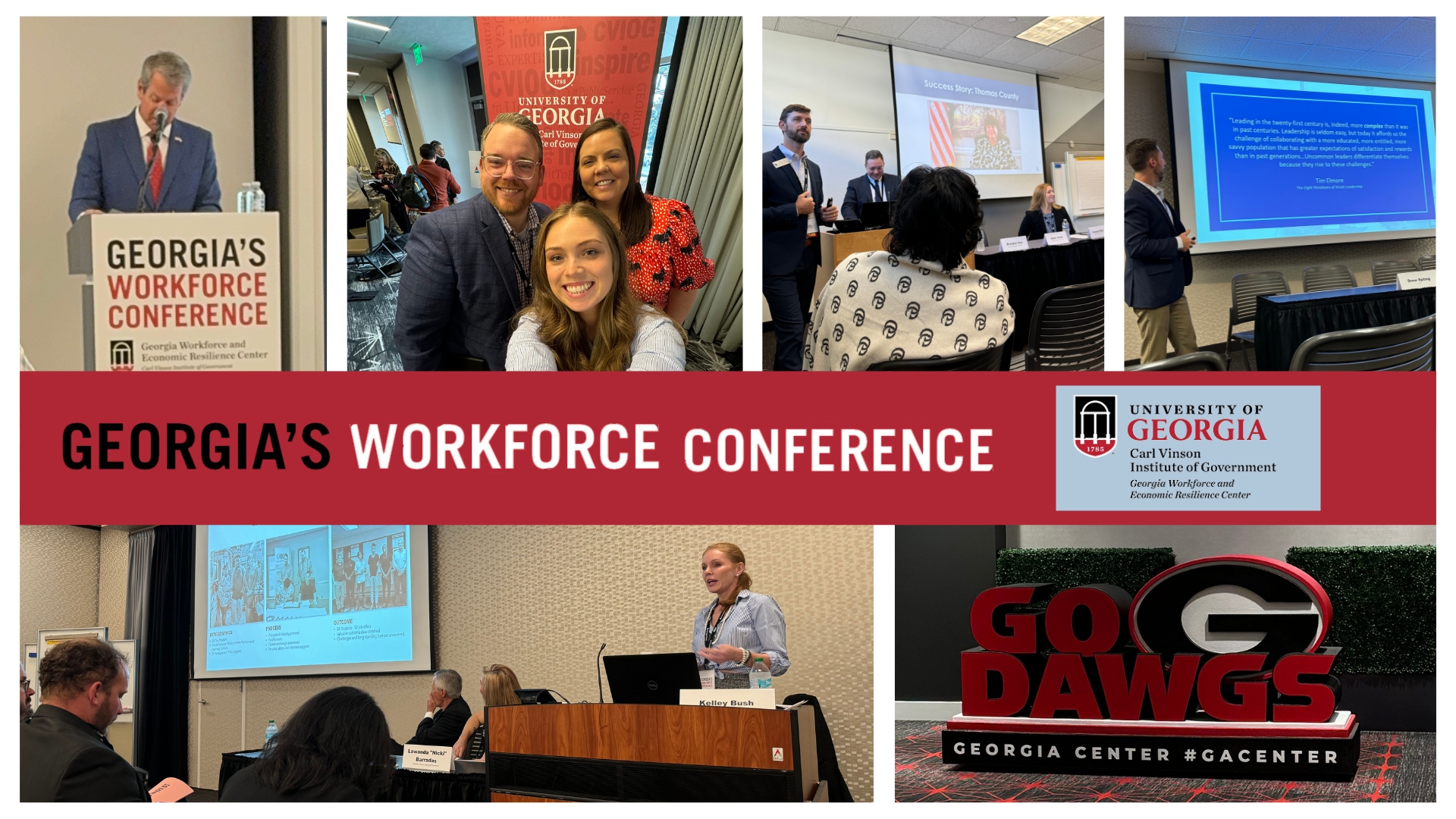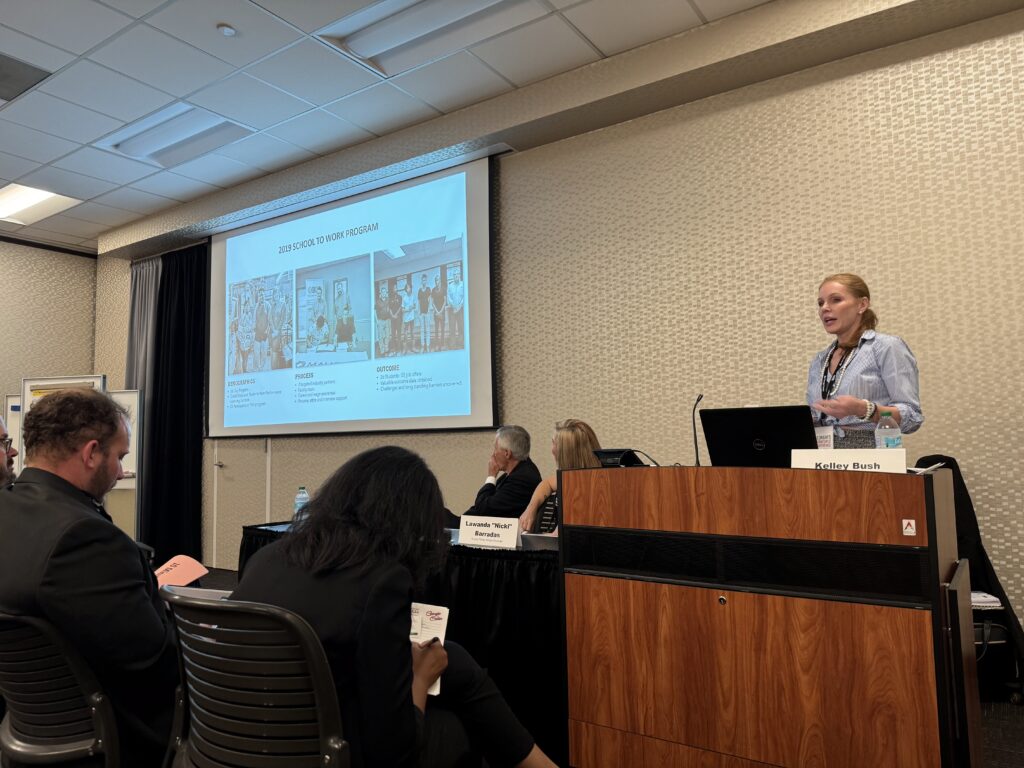25 Nov 2024
Workforce Development in Georgia: Insights from the Georgia Workforce Conference


Georgia companies, communities and organizations using innovative strategies and programs to address talent development needs.
Attending the Georgia Workforce Conference a fortnight ago at the Carl Vinson Institute of Government to explore workforce development in Georgia was both inspiring and insightful. Over two days, we heard from industry leaders, educators, and workforce professionals sharing ideas and solutions, and demonstrating why Georgia continues to be at the forefront of economic and workforce innovation.
In the opening Greg Wilson, Associate Director for the Carl Vinson Institute of Government noted, “The only thing constant in economics is change.” This sentiment echoed throughout the event as participants explored ways to adapt to the evolving needs of Georgia’s workforce. With over $79 million in investments since 2019 and more than 176,000 jobs created statewide, Governor Brian Kemp emphasized the challenge of finding highly trained workers to sustain this unprecedented growth: “We are proud of the many opportunities that so many hard-working Georgians are getting… but we know that the unprecedented job creation also comes with many challenges, including the need for more highly-trained and educated workers.”

A standout initiative highlighted at the conference was the Technical College System of Georgia’s (TCSG) apprenticeship program, which encourages public service employers to partner with local technical colleges. By providing financial incentives— up to $50,000 —this program paves the way for students to gain valuable experience while addressing critical workforce gaps.
For adult workers, the conference addressed barriers like childcare and skill development. Bright Horizons showcased partnerships that provide on-site childcare, backup daycare, and elder care to support working families.
Meanwhile, Kubota Manufacturing emphasized the importance of upskilling, and the Cartersville-Bartow Chamber of Commerce tackled recruitment challenges with a unique approach by creating a dedicated Facebook page for local job postings. This specifically addresses the workforce needs for non-professional roles and positions that might not align with traditional recruitment platforms like Indeed or LinkedIn.

LaGrange Development Authority’s Director of Economic Development and Existing Industry & Workforce Development, Kelley Bush, shared her eight-year journey in workforce development in LaGrange speaking about aligning education, industry, and local leadership. She demonstrated how intentional collaboration can create a robust talent pipeline that benefits both businesses and communities.
Employee retention strategies were a major focus as well. Companies like Aflac, Mohawk, and Toyo Tires shared insights into reducing turnover and improving engagement. Aflac’s multifaceted approach includes offering on-site healthcare, childcare stipends, and career development resources like resume editing and job shadowing. Toyo Tires eliminated involuntary overtime and incentivized employees to become certified trainers, creating opportunities for growth and leadership. Mohawk fostered employee connections by grouping new hires into cohorts and pairing them with mentors.
Generational diversity in the workforce brings unique challenges and opportunities. With five generations working side by side, Drew Epting, Director of Talent Services at MAU Workforce Solutions, highlighted the need for empathy and engagement: “Each generation brings its own set of values and expectations, creating both challenges and opportunities.” By understanding these differences, leaders can foster collaboration and productivity across age groups.
The conference explored how technology is shaping the workforce. Steven Lee, Director of US Government Analytics at McKinsey & Company, delivered a powerful reminder: “AI is not coming for your job, but your peer with AI skills is,” underscoring the importance of integrating AI training into workforce development strategies to equip employees with the skills they need to stay competitive in an increasingly tech-driven economy.

Brent Stubbs of Hyundai Motor Group Metaplant America reiterated how Hyundai and RISE are working to dismantle outdated perceptions of the industry. “In today’s world with robotics, automation, and technology, these manufacturing jobs are clean, safe, high-skilled, and high paying.”
As the conference concluded, it was clear that Georgia is not only navigating workforce challenges but also redefining how they are addressed. With innovation, collaboration, and strategic vision, the state is building a workforce prepared to meet the demands of a rapidly changing economy. Georgia is not just keeping up with change—it’s leading it.
